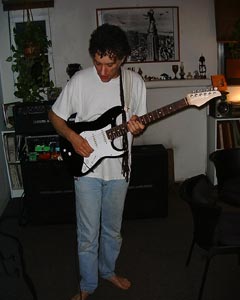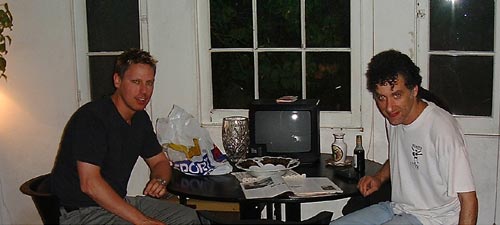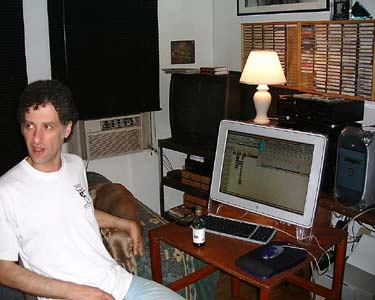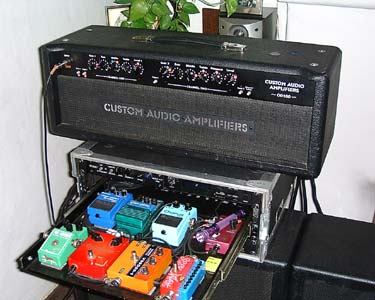This interview took place at Scott’s house in L.A., september 2000 and was printed in the Music Maker in the November issue.
:: Rocket Science is another ‘jam’ album, but it sounds a little bit more structured then ‘Thick’. How did the concept for this album come about?
“We knew for sure we were gonna do another bandimprov album, because nobody in the band wants to write tunes anymore. It’s too much trouble, because in this band nobody plays the tunes as they are intended by the composer anyway. Especially after the last album we’ve discovered it’s so much more fun to do it this way. In the past we would all individually sit behind our computers and compose, then rehearse, then go into the studio to record, then mix and then tour for a long time, all with the same tunes. In Tribal Tech we have to deal with real jazzmusician’s who love to improvise. To get those people to play a piece of written music as is, that’s almost impossible. This way we just all have more fun.”
:: Did you prepare any grooves or theme’s to jam over?
“No, nothing at all. We just jam and see what happens. It didn’t had to be a perfect jam, because there were two studio days and everybody had the chance to repair stuff at home afterwards. We did 3 albums worth of jamming! There were lots of great takes that we ended up not using for the album, because it wasn’t that strong harmonically. A lot of the time, our problem with bandimprovisations is that it’s harmonically pretty static and it doesn’t go anywhere. So we ended up not using a lot of the recordings.”
:: Are you planning to do anything with those recordings in the future?
“No, it’s to static. Kinsey really digs that stuff. Maybe he can do something with it. He makes loops and layers all kinds of sounds over it. Willis and me are more form-oriented composers. We want to hear chordchanges and a climax, so the band improvs sound more like a tune and not like just an ordinairy loop. One thing we did with this album that we haven’t done before, is calling chord changes while we’re jamming. A lot of times a new key will make you think differently and the rhythm changes, too. One thing that works too, are huge differences in volume. If somebody starts playing really loud, or just really soft, that changes the total image completely.”
:: Where was the album recorded and what format did you use?
“Basic tracks are recorded in the studio of Musician’s Institute, where I teach. We also recorded ‘Vital Tech Tones’ there. We recorded everything using the Mac Digital Performer, the whole band uses the same format at home. That’s also convenient for exchanging files. The 2408 is the interface. ProTools has a lot of hardware which comes with the system to do all the processing work. With the Digital Performer, the computer has to do all the processing work the hardware does for Pro Tools. The problem is the latency: if you monitor yourself through the computer while playing, there’s this few milliseconds delay, which makes it real annoying, really impossible to play. The only way is to monitor yourself before going into the computer. I use a digital preamp, the Studer D-19, which I use as a microphone preamp. From there I go to the Yamaha O1V, a 24 Bit digital mixer and to the Mac. If people can hear the difference between tape based recordings like ADAT and digital, like on the Mac; fine, but I don’t hear any difference.
:: How do you simulate a live playing environment for the band, when the studio is such a hard place to get that kind of sitiation going, with seperated rooms for the musicians?
Since the last album, we’ve been recording with Kirk pressed up with his nose to the glass of the recording booth.The rest of the band is in the control room. Like that, it’s just like being on stage.
:: How do you prevent leaking in the studio?
Bass and keys go straight into the board. I always bring my isolation box for my speaker. I use it at home too and it enables me to record at night without disturbing the neighbours or my wife. Also, with this box, my tone remains constant where ever I record. When I want to repair something I did in the studio, I’m not dependent anymore on the room I’ve recorded in; the isolation box makes sure my tone’s the same everywhere. On the last album, I wasn’t able to repair anything anymore because I couldn’t get the sound I had in the studio at home anymore.”
:: How does the music evolve after you leave the studio with the recorded band improvs?
We took the jams that sounded most like real tunes. Everybody in the band got their own little project; this time I got three ,Willis three and Kinsey four. We thought it would be a good idea to give somebody a tune if that particular tune features that person prominently. He can change anything he wants to at home. For instance, on the ballad I have kept the solo, but muted the keyboardtracks and layered some different harmonies underneath. Later on, the bas and keys complemented that, so it became a real song. Kinsey cut a short guitar theme in one of his projects, pasted it all over the tune and doubled that with keys. This version was sent to the other musicians so they could fill in their parts. I wasn’t really happy with my performance on the basic tracks, but I ended up keeping quite a lot of it, I think around 40%. Some solos I repaired by replacing a few phrases, and there’s a few I completely redid. We kept all of the drumtracks and 90% of the bass. Kinsey is pretty easy with his live parts, he ends up keeping most of it. I tend to be very critical, especially with my tone. If I like the notes, but don’t like my tone, I redo it.”
:: One thing that hit me on ‘Rocket Science’ is the fact that every sound seems to be altered in a pleasant way.
We consiously wanted to do an album contaning more different sounds. On ‘Thick’ I almost exclusively just used the sound of my amp. This time, I even went out to check out different pedals. I bought a Seek-Wah and a Ring Modulator. I even tried a whammy pedal from a friend of mine. It’s a really great pedal, but I couldn’t find any decent song for it. Maybe on the next album.”
:: Why are you using two 4 by 10″ speakerenclosures instead of the usual 4 by 12″ Custom Audio enclosure lately?
Those are Kendrick Blackframe 10’s. They sound a lot darker then the Celestion 12″ speakers and they have this fat midrange, which seems to be working out for my blues trio really well. They don’t sound good with humbuckers for me, but singles do work great with these speakers. I got the basic idea from Micheal Landau, I saw him performing live with those speakers a lot of times, and I really dug the tone he was getting from it. The speakers are only 20 W; I already blew a few of them because my power amp was too powerful. Now I use two enclosures and there’s no problem anymore. But with Tribal Tech, I’m still using one 4 by 12″. It cuts through better if you play with a keyboardplayer, humbuckers seem to work better for that, too. My humbuckers are housed in a single space. That’s the only difference between the blues trio and Tribal Tech, the pick ups and the speaker enclosures. Everything else is exactly the same.”
:: (looking around his homestudio) Is that a line 6 Pod in the corner? Scott with Pod?
Yeah! I mainly use it to practise through, so I can save my amp tubes a little bit. Line 6 is getting to te point where they can replace tubes with their stuff, but they’re not quite there yet! It might sound the same but it feels different when you play through it. A tube amp blowing at full volume reacts to your picking technique, and the POD can’t do that�. yet! Sooner or later they will find out and tube amps will be history.”
:: What are you studying lately?
“My problem is that I want too much. I like to play over difficult chord changes, I like to play Blues, Rock ‘n’ Roll, Jazz, I want it all! Sometimes I want to be the best standards guitarplayer and I want to learn new chord voicings. I took some lessons from Ted Greene at that time. After a couple of months I throw it all away and all I’m only interested in how my G-string sounds on my strat. Then I’m dissatisfied with my technique and only practise my legato for a while. I will probably never really get good at one thing, there’s just not enough time for that. There was a time in my career that I really worked hard on timesignatures. I really wanted to be able to improvise over uneven time signatures and write odd-meter tunes. Like Allan Holdsworth does in his improvisations. You can here a lot of that in Gentle Giant compositions, the odd meters are alway a result of the tune and not the other way around, they sound very natural. At 16, I got my solo flying license. At one point, I was more relaxed flying a plane then driving a car. But I just didn’t enjoy it. I realised that, no matter how good I was gonna get playing odd meters, I just had no fun doing it and I quit. And became a � – 4/4 musician! (laughter)
:: Your smooth tone has always been very special and recognizable, but lately you have gone more into the Strat direction.
I work a lot on my tone. Things changed a few years ago when I realized my tone wasn’t as good as I always thought it was. Now it has become some kind of obsession. Especially with Strats. I don’t know what it is�maybe something from my youth or college time when I was young. It’s just important for me right now to get a Strat tone that impresses people. I get help too, you know. Some friends stop by with a car full of equipment and pedals and we check that stuff all day long.Alexander Dumble lives down the road and sometimes I will loan some amps from him. Bob Bradshaw and Custom Audio Electronics are pretty close and they know everything about amps and tone. It’s also about following a tradition. It kind of started out with Hendrix. Somebody like Mike Landau helps to develop that tradition a little bit more. For me, I’m not traditional in any respect. But when I got into the blues more and more during the last six years, I learned to respect the tradition of the past. I suddenly realized how important Richie Blackmore and Jeff Beck were. Technically it was not really anything special, but tone wise and music wise, it was incredible. I really love the music of the ’60’s and ’70’s, that’s the stuff I grew up with. It’s my roots and you can not escape them. Even today, that music gives me more goosebumps than anything else.”
:: What about your future plans?
“What I really would like to do is a project with Kinsey and a ‘real’ jazz drummer, with a stand-up bassplayer. I want to play real-book tunes, 16 bar solo stuff, but original compositions. Kinsey would like to have Marvin ‘Smitty’ Smith on drums. I got a budget from a new label to realize this project, but it got cancelled at the last moment. Playing standard Jazz is one thing I really miss. I don’t do it with Tribal Tech, or with my Blues Trio. I also would like to play really soft again, it has something special, that way it’s more about the note choice and less about energy. I do a lot of sessions around town with Dave Carpenter playing stand-up bass and it’s really great to play with him. It’s not really necessary to build things up. You don’t have to start your solo soft and build to a climax, it just kinda ‘sits’ there and grooves on. You don’t have to stop soloing because it can not get any louder; which is also ridiculous, you’re just finished when you’re finished. That’s one of the disadvantages of playing Rock and Fusion, the volume tells you where you are, and that sometimes takes away from the notechoice you have or want to make. I like to play in a trio too. I was more or less inspired by a few Holdsworth gigs I saw, and Mike Landau plays trio, too. I have pretty much composed throughout my entire career, and I have the tendency to, unconsious, diminish my role. I more or less have the role as the saxophone player in the band playing melodies and the keyboardplayer gets the best job playing the fundamental parts of a tune with chordvoicings and harmonies. At one point I though; if they can do it, I can do it too. I like the responsibility it brings and it makes you more important in the band.”



